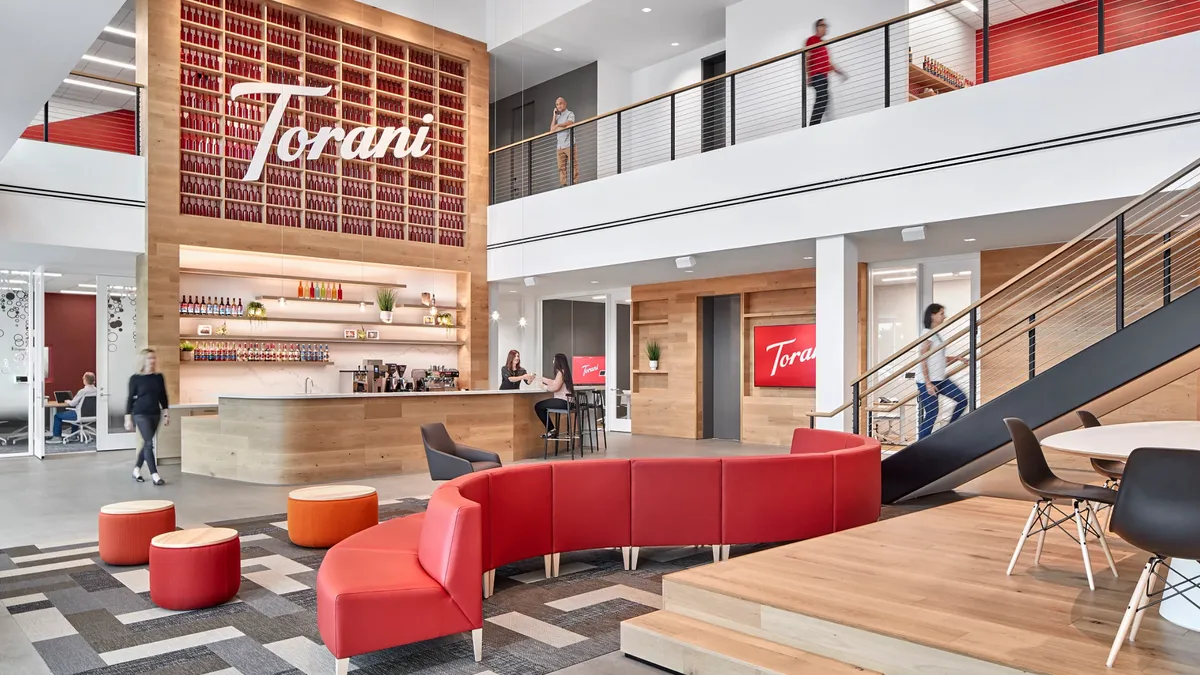Many HR experts tout the benefits of upskilling as a retention tactic. A look into Torani’s recent diverse hiring push paints a slightly different portrait: A company culture of upskilling can help employers reach their diversity goals more rapidly while also sustaining a solid talent pipeline and life cycle.
Torani recently announced that over the past five years, its HR department “has doubled down” on its diverse recruiting efforts. But what does that actually mean?
The syrup company said it increased representation of women by 625%. Becca Russell, Torani’s chief of people and opportunity development, explained that while half of company leadership has long been women, the demographic was underrepresented in front-line manufacturing and distribution roles. Now, almost 28% of those roles are filled by women — something Torani called an “impressive feat” due to the field’s history as a male-dominated space.
Adding some context, the U.S. Bureau of Labor Statistics’ latest “Women in the Labor Force” count indicates that women are overrepresented in industries like education and health services (where they make up 75% of the workforce). By contrast, women comprise 11% of talent in construction, about 15% of the mining workforce, about one in four transportation and utilities workers, and about 30% of people in manufacturing.
Torani’s own talent overhaul started with the design and launch of its new facility, nicknamed the “Flavor Factory,” in 2020.
Through automation, Torani made manufacturing work less strenuous for people assigned female at birth. Previously, syrup workflow required thousands of empty bottles to be loaded manually; now they are automatically fed.
Instead of hand-weighing ingredients, workers handle pre-measured ingredients that are automatically incorporated into mix tanks, via touch-screen machinery. “This shift from demanding physical labor enabled us to diversify our workforce significantly,” Russell told HR Dive via email.
More than mechanics, the people team’s practice of hiring for potential expanded possibilities for women at the company. Russell noted the mass attrition of women from the workforce that continues to take place throughout the pandemic.
“At Torani the trend was the opposite,” Russell said. By offering the opportunity to upskill as well as flexible roles, Torani’s jobs have “been particularly compelling to women,” she added. Broadly speaking, it’s phenomena like the mass exodus of women from the workforce that have caused benefits such as flexibility — in part to accommodate caregiving demands — to be a top draw in 2022.
Throughout 2022, many high-profile companies have notably been carving out paths forward for caregivers that have stepped away from paid labor and toward their family. Earlier this year PepsiCo followed the lead of Goldman Sachs, IBM and JP Morgan Chase in creating “returnships” to help pick up again with their careers. Likewise, Schneider Electric’s maintained a returnship program, which sought to slowly re-integrate women on hiatus back into the workforce. Like Torani, Schneider Electric also aimed to champion women in spaces where they are underrepresented.
“What sets us apart from many manufacturers is that we are excited to train for manufacturing skills, to help create onramps for prospective team members who normally wouldn’t be qualified,” Russell said in an email.
“Our distribution team is finding new ways to pick and ship complex orders each day to better service customer. These new ideas come from having diverse perspectives at the table.”
Becca Russell
Chief of People and Opportunity Development, Torani
By offering every temp the opportunity to work at Torani as a traditional employee, the company has also created a sustainable talent pipeline. And as Russell emphasized, there’s a framework at the syrup manufacturer to support upskilling, through L&D programs and something she called “career mixology.”
If a recruiting arm — or even an “HR department of one” — wants to start hiring diverse talent for potential, the character of the candidate should be top of mind, Russell suggested.
“We have a multi-step interview process where every step builds upon the last,” she said. In the first interview, her team shares about their company culture and what the role entails. They also learn about the potential hire, that person’s needs and their desires.
“We then move onto a group interview process with a diverse panel of Torani team members from across our organization, to ensure we have representation of a variety of experiences and perspectives,” Russell explained. Throughout the process, the Torani team primarily is looking for competencies and values, she said.
Naturally, Russell spoke to how the hiring push was worth the effort and investment. Front-line “Flavor Factory” workers have drummed up creative ways to reduce down time, for example, with a new break schedule. “Our distribution team is finding new ways to pick and ship complex orders each day to better service customers,” she said. “These new ideas come from having diverse perspectives at the table.





















